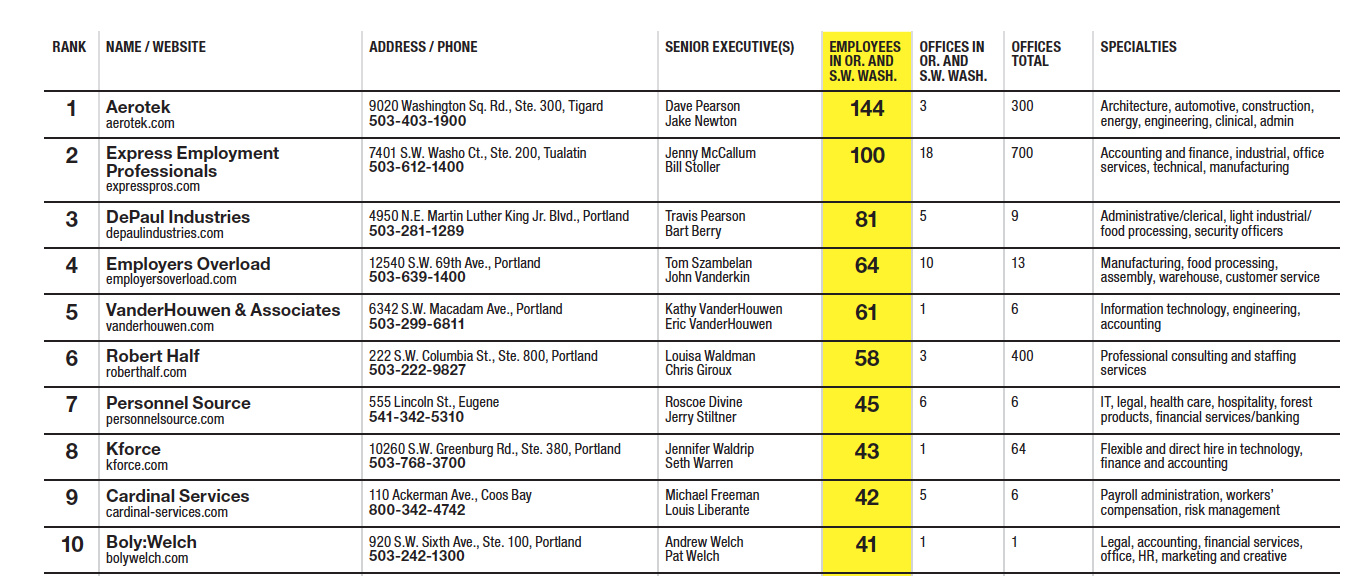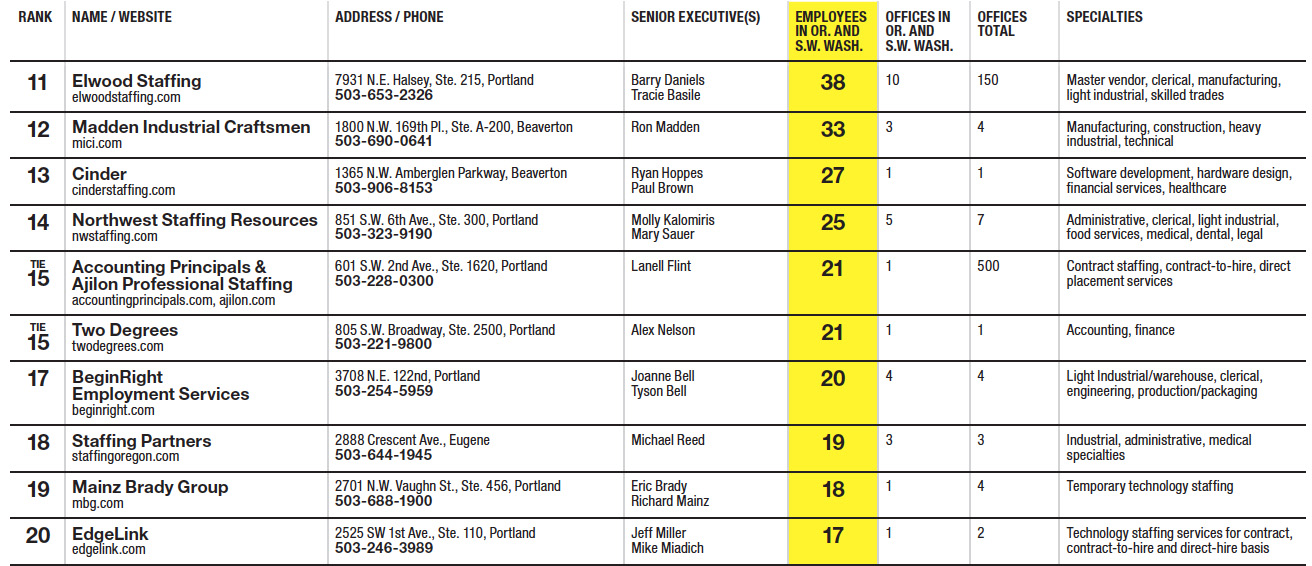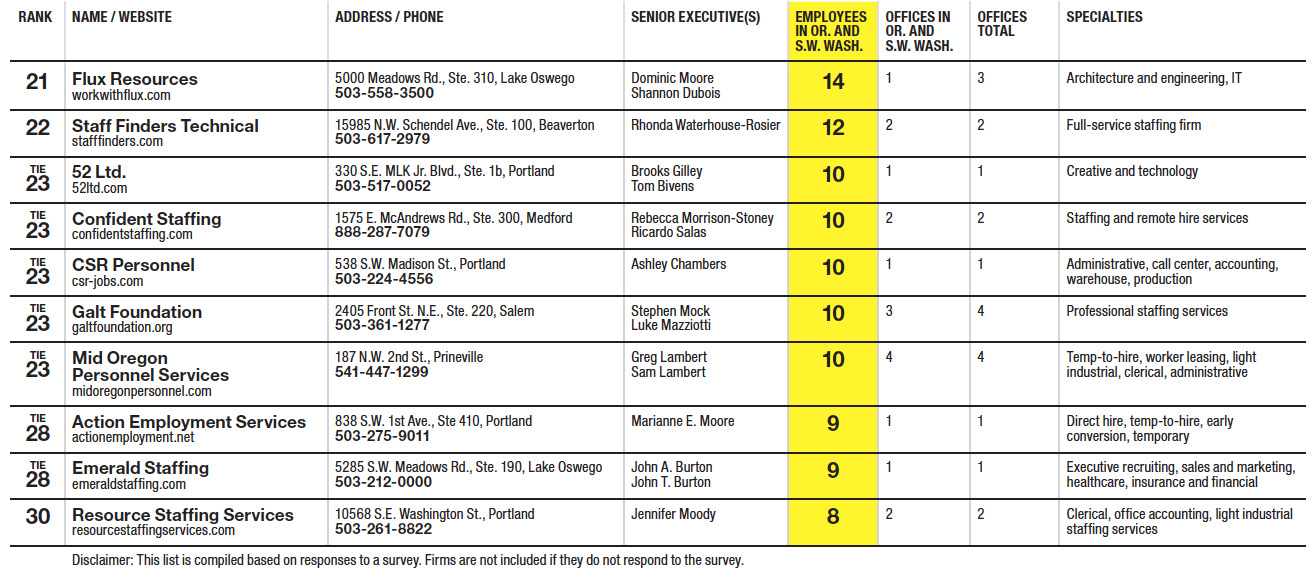Oregon’s top staffing firms are always looking to expand.
Vanderhouwen & Associates is looking to expand outside its home state of Oregon to do business these days. The staffing firm recently opened offices in Dallas, Texas and Bellevue, Wash. It is also interested in setting up shop in the Bay Area and has considered moving into Arizona and Colorado.
The company’s out-of-state expansion reflects the recent influx of business clients into Portland that are national in scale and need to recruit staff from all over the country.
“There is a huge value in knowing about the local market, but clients are also looking for staffing firms that can service the market nationally,” says Geoff Smith, regional business development manager at VanderHouwen & Associates. “When you work for a local company and are purchased by an out-of-state company, staffing companies are asked to place people corporation wide or they risk being replaced by another staffing firm.”
To be sure, Portland is no longer the backwater it used to be. The recent influx of businesses that have either bought local firms or set up branches here has given the city a more high-profile, cosmopolitan feel. It is also a boon for staffing firms that are recruiting for the newcomers. But the influx is also requiring agencies to be more flexible toward client staffing needs, which are changing in the rapidly globalizing economy.
Andrew Welch, president of staffing firm Boly:Welch, says the recruitment industry is benefiting not only from businesses moving here but also from increasing numbers of people who are interested in living in the state. “In a lot of ways, we can be the front line or the landing beach if you will, for people who are interested in making a move and putting their feelers in the water,” says Welch.
Most of the new business clients Welch is seeing are large, out-of-state companies that are creating outposts in Portland. “A lot of that is the perception that there is talent here; that it is cheaper than the markets they are operating in,” he says.
Technology companies are a big part of the migration to the city. A lot of tech firms based on the West Coast are choosing to open an office in Portland because their employees prefer to live here rather than in more expensive locations, such as the Bay Area and Seattle. “There is no question that Oregon is a destination for workers, and it is more affordable than the Bay Area,” says Smith.
Google is one big name in tech that just opened an office in Portland. In April it bought space in the U.S. Bank building in the city’s downtown. Local technology companies that were recently acquired by out-of-state firms include FEI Co.’s sale to Massachusetts-based Thermo Fisher Scientific in May and Elemental Technologies’ sale to Amazon in 2015.
“There is a huge value is knowing about the local market, but clients are also looking for staffing firms that can service the market nationally.”
Geoff Smith, VanderHouwen & Associates
Not all local recruitment firms feel the need to expand geographically as more national and international businesses establish roots in the state. Tyson Bell, president of BeginRight Employment Services, a local employment agency, says staffing firms do not need branches in other states to recruit for national clients. Firms can successfully use one staffing firm, which then subcontracts with local agencies to find talent, he says.
“It’s a more cost-effective way to deliver by not having brick-and-mortar operations in other states, because with that added expense, it is washed into the bill rate to the client,” says Bell.
Other local recruitment firms are looking at diversifying their client services to stay profitable. Ken Madden, owner of Madden Industrial Craftsmen, an agency that specializes in the traded sector, says the skills shortage is so acute that he sees an opportunity for his staffing firm to be more involved in training staff. “At the federal and state level, there is more focus on apprenticeships. Staffing firms have not been in that area. I would like to become a training agency — that would be transformative,” says Madden.
The skills gap for certain trades is so bad that clients are now more prepared to pay direct-hire fees for jobs that they would not have entertained paying a fee for in the past, says Madden. He is also seeing more demand in the traded sector for people with project management experience. These days he spends more time recruiting people who went into jobs in the last recession that they were overqualified for. “Now we are trying to get them to leave those jobs. Our recruitment is targeted at people who are underemployed, to bring them back up the ladder.”
Some staffing firms see more of a role taking on consulting work for clients. As more companies focus on hiring a diverse workforce, they are looking to staffing firms for advice and help recruiting underserved populations. Companies are also focused on leaving a good impression on interview candidates because of the rise of consumer websites, such as Glassdoor, where candidates can leave comments about their interview experience, says Welch.
Staffing firms are benefiting from the migration of businesses and people to the state. But adaptation is key to their survival. The business environment is changing so quickly, the sector has to be nimble to keep up with the needs of clients. Whether it is moving into new locations, training staff or doing more consulting work, the changing face of business is keeping recruitment agencies on their toes.
POWERLIST








